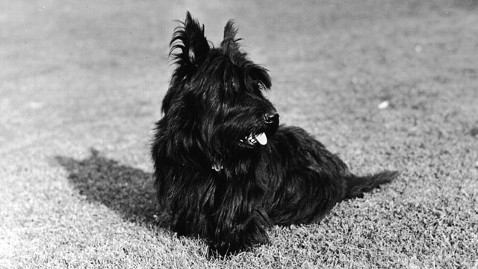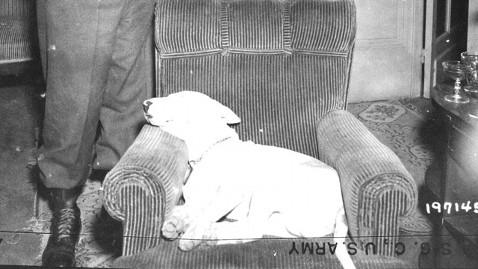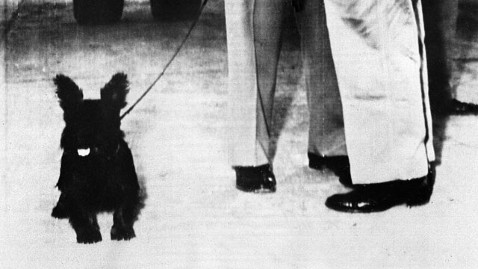Dogs: The Furry, Faithful Secret Weapons of WWII
They had the fate of the world in their hands, and their faithful dogs by their side. As President Franklin D. Roosevelt and his two top generals waged war against the Nazis, the men all relied on a secret weapon: their dogs. Dog-lover and author Kathleen Kinsolving is convinced the dogs helped FDR, and Gens. George Patton and Dwight Eisenhower handle the enormous stress of battle.
She has written a book, "Dogs of War," that documents the special relationship between these powerful men and their canine companions. In the book's forward, Carlo D'Este, who has written books on both Patten and Eisenhower, wrote that the dogs "helped provide the men a "time of normalcy and joy … to help lighten their load."
Studies have found that dogs can reduce stress, blood pressure and anxiety. "I think that's what inspired me to write this book," Kinsolving told ABC News, "to show how important the human-animal bond truly is."

President Roosevelt's dog, Fala (Hulton Archive/Getty Images)
In her mind, "We owe these dogs of war a great debt." FDR's dog Fala was a gift from the president's cousin Margaret in 1940. "The war was heating up over in Europe," Kinsolving said, "and she thought, 'I bet he could use some companionship .'" The Scottish terrier and FDR were soon inseparable. According to Kinsolving, Fala attended press conferences and the evening cocktail hour, and had his own playpen just outside the Oval Office. As befitting a "first family" pet. Fala learned to shake hands, and stand at attention on his hind legs during the "The Spangled Banner."
He was soon a huge hit with the press and the public, and even joined the war effort as a member of "Barkers for Britain," a club of dog owners who helped raise money for bombing victims in England. Fala also figured prominently in a political smack down when FDR was running for an unprecedented fourth term. The pooch had accompanied FDR on a voyage to Hawaii and the Aleutian Islands as part of tour of the Pacific Theater.
Republicans claimed that Fala had been mistakenly left behind in the Aleutians, costing taxpayers millions for a destroyer that was sent back to rescue him. In what became known as the Fala speech, Roosevelt angrily denied that, and said that while he and his family could withstand partisan attacks, "Fala does resent them" and "has not been the same dog since." It brought down the house.
Dogs have played a role in other political campaigns: President Nixon's famous Checkers speech, and this year's presidential election. Former Gov. Mitt Romney came under criticism for driving to a family vacation spot with his dog in a cage strapped to the roof of the car.
Fala is buried at the foot of FDR's grave and memorialized in a statute at the president's side at the FDR Memorial in Washington.
Across the Atlantic, Gen. George Patton, known for his brilliance but also his temper, had "a soft spot" for dogs, says Kinsolving. In 1944, now stationed in England, Patton requested a bull terrier, and soon had his faithful Willie. "Willie would attack any dog if he felt [it] was a threat to Patton," said Kinsolving, even going after Eisenhower's pup when the Allied commander once came for a meeting. Willie followed Patton everywhere, sticking "so close to the general, he never needed to wear a leash," wrote Kinsolving.

General Patton's loyal pooch, Willie (PhotoQuest/Getty Images)
In 1945, Patton died, following a car crash in England, right before he was to return to the United States. That day the general had not taken Willie with him. It was a photo taken after Patton's death that moved Kinsolving to write her book. It shows the "heartbroken bull terrier … as he lay down on the floor next to Patton's footlockers," she wrote.
In the case of Gen. Eisenhower, Kinsolving wrote it was the general's driver, the lovely Kay Summersby, who wanted a dog. Historians still debate whether the two had had an affair, but they were extremely close, and according to Kinsolving, the general knew it wouldn't look good if he got Summersby a dog. Instead, the Scottish terrier was presented to Eisenhower as a birthday present in 1942.

Eisenhower's beloved terrier, Telek (U.S. Army/AP Photo)
Ike gave it the unusual name Telek, which Summersby later said was a combination of Telegraph Cottage, Eisenhower's retreat outside London, and the first letter of her name, Kay. The general may have been an expert at whipping the troops into shape, but he was no match for Telek, who was not housebroken for some time. The dog even left his mark on Gen. George C. Marshall's guest bed when Marshall came to spend the night at Eisenhower's villa.
Telek, though, showed his true colors when the Nazi brass came to Eisenhower's headquarters in France to sign the papers of surrender. "Dogs are psychic," Kinsolving said, "He growled when the Nazi's left."
Presidential pets have long been crowd pleasers, and the current canine resident of the White House is no exception. The much-filmed Portuguese water dog, Bo, was a promised gift to President Obama's daughters after he won election in 2008. Upon winning his second term, Obama joked that one dog was enough; there would be no repeat in the dog department. Kinsolving is disappointed about that. "I do hope he changes his mind," she says.